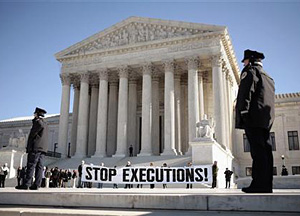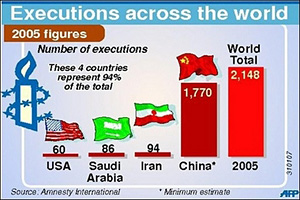 |
 |
 |
 Editorials | Issues | February 2007 Editorials | Issues | February 2007  
Death Penalty: Abolition, a Capital Issue
 Marie-Laure Colson - Liberation Marie-Laure Colson - Liberation


| | Protesters calling for an end to the death penalty unfurl a banner before police arrest them outside the U.S. Supreme Court in Washington January 17, 2007. (Reuters/Jason Reed) | 
| | A graphic showing the number of executions in each country that applies the death penalty. China defended its use of the death penalty amid an international campaign urging the country to abolish capital punishment as part of a human rights clean-up ahead of the 2008 Olympics. (AFP Graphic) |
"A country passionate about freedom cannot retain the death penalty as part of its laws." These were the words with which Robert Badinter started his August 1981 plea in favor of abolition of the death penalty. A quarter-century later, the death penalty has definitively passed into history for France. The National Assembly voted Tuesday for the abolition to be inscribed in the Constitution. The fight, nonetheless, is not over. Sixty-nine countries still apply capital punishment, and, in about thirty others, the death penalty is still part of the law.

The third Global Congress against the Death Penalty, which opens in Paris today as an initiative of the association Together Against the Death Penalty (ECPM) has set itself a goal that even several years ago seemed illusory: "universal abolition." But mind-sets and political regimes have integrated, more quickly than expected, the iniquity and the ineffectiveness of a punishment that is above all a human rights violation. Since the second Global Congress, which took place in Montreal in 2004, four new countries - Senegal, Mexico, Liberia and the Philippines - have joined the abolitionists' side. At the dawn of the twenty-first century, nearly all democracies have ceased executions, with the notable exceptions of Japan and the United States.

Uneasiness

George Bush's country - along with China, Iran, and Saudi Arabia - belongs to the squad of four countries responsible for virtually all (94 percent) executions. Just this Tuesday, Texas executed 31-year-old Christopher Swift, found guilty of strangling his wife and mother-in-law, by lethal injection. Ten other executions are planned in that state for 2007.

And yet, even in the United States, executions continue to decline: 53 in 2006, or the lowest number since 1996. Last year, 114 death sentences were pronounced, while there were about 300 a year during the 1990s. Judicial mistakes, confirmed by DNA tests, have created uneasiness in a public a majority of which was just recently in favor of this punishment.

March

Over a thousand people and a hundred contributors are expected in Paris for this third Congress, at the initiative of an association created in 2000 by Michel Taube under the impulse of a fit of anger after the broadcast of a report on an American sentenced to death, Odell Barnes. This Congress will take place at Paris's Cit Internationale Universitaire and will conclude with a march starting at the Bastille. China, where the Olympic Games will take place next year, will be one of the big themes of this third Congress. The ECPM will launch "a solemn appeal for a cessation of executions," which should be supported most notably by athletes. Other regions targeted are North Africa and the Middle East. "One of this Congress's main goals is to give an international platform to the militant abolitionists from those regions," writes ECPM's managing director in his introduction to the meeting. "Our ambition is clear: why shouldn't the 100th abolitionist country be an Arab country, and, at the same time, the first from Africa or the Middle East?" Not one of the region's 22 countries has abolished the death penalty yet. The ECPM notes that "Saddam Hussein was executed December 30 under shameful conditions, at the end of an unjust trial and without most of his crimes ever having been tried."

Moroccan Coalition

A debate will also be organized around the death sentence pronounced against five Bulgarian nurses and a Palestinian doctor in Libya December 19th. In North Africa, Morocco, Tunisia and Algeria still pronounce capital punishment, but haven't executed anyone for the last ten years. Timidly, abolitionists are beginning to make themselves heard. At the initiative of the Moroccan Prison Observatory, a Moroccan coalition against the death penalty was formed in 2003.
Conscience and Consciousness
Renaud Dely - Liberation

The images of Saddam Hussein hanging at the end of a rope will undoubtedly do much for the abolitionist cause. George W. Bush in person has measured the damage effected by the film of the former Iraqi dictator's execution. That's saying a lot. The admonishment he gave with respect to such a pretense of justice did nothing but repaint the United States a little more as a singular democracy endowed with medieval mores. Capital punishment can't stand the light. It happens in haste at the early morning hours, at the end of an endless corridor, in a windowless room or a tiny courtyard. But above all, not in front of a camera, or on the Net.

Certainly, advertising it is not enough to make it disappear. The death penalty survives the new rites of the public opinion democracy and no poll has ever brought about its extinction. The mob of an electorate thirsty for revenge may even applaud it. But an individual conscience passionate about justice cannot bear the vision of such a punishment. The abolitionists have played on that domain during the course of the centuries. That is the cord that the Congressional delegates meeting in Paris today want to make vibrate.

In spite of the reductions occurring around the world, the attitude of India, Japan, and - of course - the United States is there to remind us that you don't have to compete in the dictatorship category to land a high place in the prize list for barbarity. The death penalty is not only a matter of regime. In 1957, Albert Camus had preached its suppression in the name of an axiom that also holds true for democracy: "Crimes by the government are more significant by far than crimes committed by individuals." Therefore the former may not set itself up as the executioner of the latter. France took its own sweet time to join - only twenty-five years ago - the side of the Enlightened. It therefore has no basis for being surprised that countries, even democratic ones, still delay rallying to the goal of universal abolition.

Translation: t r u t h o u t French language correspondent Leslie Thatcher. | 
 | |
 |



